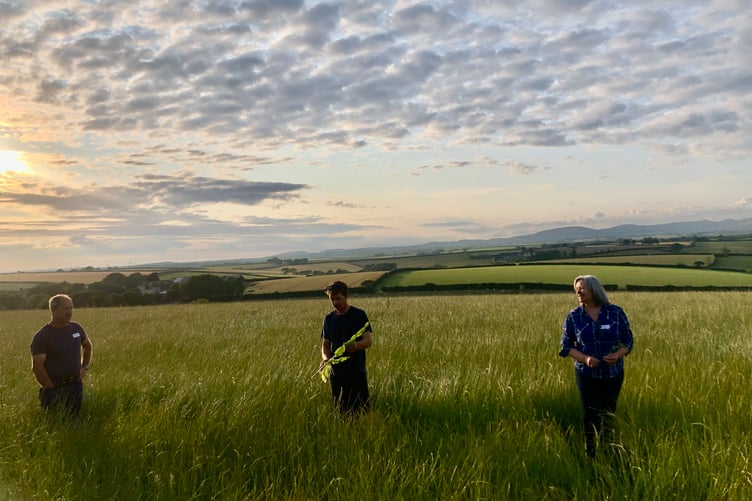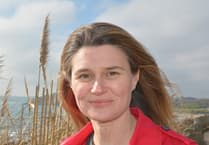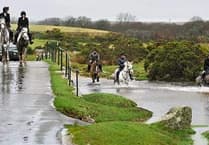FARMERS in the Mevagissey catchment are helping two nature-based projects improve climate and flooding resilience in the area.
The Tackling Climate Change - Flood Prevention Project (TCC), pioneered by Climate Vision and involving residents, farmers, businesses, and government authorities has culminated in a significant milestone combining climate resilience with sustainable agriculture.
Luci Isaacson, director of Climate Vision, said: “Through the support of private investment into on-farm, nature-based solutions, our soil testing has revealed this innovative trial project has sequestered 17.84 tonnes of carbon in one year (13 per cent), a significant leap from the (zero to five per cent) increase that was expected in year one, providing ground-breaking insights into a net zero future, while tackling flooding, soil health and sustainable farming practices.
"The government recognise how private investment can help fund a range of what is known as ‘ecosystem services’, such as flood management and providing for bees - here we can provide evidence and data to support that pathway, while inspiring Cornish companies to actively work on reducing their environmental footprint."
Tregoad Holiday Park, near Looe, invested £2,500 to sow herbal ley seeds at Higher Kestle Farm, St Ewe, which germinated during the drought of 2022.
Herbal ley, with its deep roots, brings numerous benefits, particularly in mitigating flooding by holding rainfall in its growth while enhancing soil and animal health.
Miranda Jacobs, director of Waterside Holiday Group which runs the park, said: “Climate Vision has helped make net zero accessible – rather than being a massive hill to climb.”
More than 125 people attended and took part in events at Higher Kestle Farm and the SW Climate Change Centre field trips, complemented by enlightening climate education sessions.
Richard Lobb from Higher Kestle Farm said: “We hosted three events at the farm to show people what we have done for natural flood management.
“It was nice to see people cheered up by our story after Luci told them straight about climate change but in a way that inspired them to do something, hopefully buying our seasonal food at the shop.”
The combined effort of Tregoad Holiday Park, Higher Kestle Farm, Climate Vision and local communities has demonstrated the power of local collaboration in addressing climate change.
Luci added: “By working together, we can reduce flooding, enhance the environment, and secure our future through interesting solutions."
The project has been supported by the UK government through the UK Shared Prosperity Fund.
Martyn Alvey, Cabinet Member for Environment and Climate Change and Cornwall Councillor for Feock and Kea, said: “Not only has the project showcased an innovative and collaborative approach to natural flood management, but it has also further demonstrated clear benefit in promoting sustainable agriculture through its impressive evidence of carbon capture and improved soil health.”
As the TCC project ends, a second Natural Flood Management scheme in the Mevagissey area, led by Westcountry Rivers Trust (WRT) and working with the community, farmers, the Environment Agency (EA), Climate Vision, Cornwall Council, and the University of Plymouth, begins.
The Climate Resilient Mevagissey (CRM) project, funded by Defra’s Natural Flood Management programme, will support the area’s resilience to floods.
Dr Laurence Couldrick, CEO at WRT, said: “Mevagissey is a steep-sided rapid-response catchment which has flooded 27 times since 1960, most significantly in 2010 when more than 70 homes and businesses were flooded.
“As flooding can occur within an hour of peak rainfall, which is why our project is designed to slow, move and store water through soil management and nature-based solutions.
“This builds on important past work and relationships in the area, as well as integrating with existing projects such as Resilient Catchment Communities funded through the Shared Prosperity Fund.”
This will be at a scale and density for change to be monitored through the EA’s flow gauge station on the Mevagissey Stream.
Farmers are already committed to supporting the scheme to help ensure land management practices reduce run-off.
Luci Isaacson, director of Climate Vision, said: “We are thrilled to continue elements of the TCC project in CRM.
“Recognising the significance of local knowledge, our focus on natural flood management in Mevagissey extends beyond mitigation measures - we aim to foster discussions about aligning what we purchase with a more sustainable, long-term perspective to enhance resilience.
“We have sought input on the flood management possibilities with farmers, prioritising their needs and preferences such as shared machinery that improves soil health to ensure delivery of practical and community-driven solutions.”
People living in the catchment will be encouraged to volunteer as part of the project, including through citizen science.
Cllr James Mustoe for Mevagissey and St Austell Bay, who also attended talks about and visits to the farm in Climate Vision’s TCC project, said he is delighted to see this new innovative bid progress, and the enthusiastic endorsement from the local farming community.
“The proposals make a clear and persuasive argument for green and sustainable steps that can be taken to reduce flooding in our parish.
“I hope to see the project make a positive difference for the community of Mevagissey in the future.”
The project is one of 20 across seven River Trusts awarded funding from Defra’s £25m Natural Flood Management programme for nature interventions to protect communities at risk of flooding, as well as improving biodiversity and habitat.
To find out more visit wrt.org.uk





Comments
This article has no comments yet. Be the first to leave a comment.